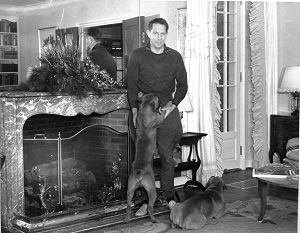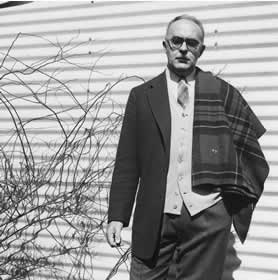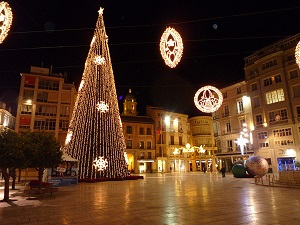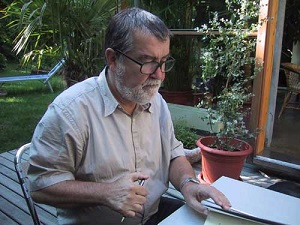De Amerikaanse schrijver Louis Bromfield werd geboren op 27 december 1896 in Mansfield, Ohio. Zie ook alle tags voor Louis Bromfield op dit blog.
Uit: Early Autumn
“There was a ball in the old Pentland house because for the first time in nearly forty years there was a young girl in the family to be introduced to the polite world of Boston and to the elect who had been asked to come on from New York and Philadelphia. So the old house was all bedizened with lanterns and bunches of late spring flowers, and in the bare, white-painted, dignified hallway a negro band, hidden discreetly by flowers, sat making noisy, obscene music.
Sybil Pentland was eighteen and lately returned from school in Paris, whither she had been sent against the advice of the conservative members of her own family, which, it might have been said, included in its connections most of Boston.
Already her great-aunt, Mrs. Cassandra Struthers, a formidable woman, had gone through the list of eligible young men – the cousins and connections who were presentable and possessed of fortunes worthy of consideration by a family so solidly rich as the Pentlands. It was toward this end that the ball had been launched and the whole countryside invited, young and old, Spry and infirm, middle-aged and dowdy-toward this end and. with the idea of showing the world that the family had lost none of its prestige for all the lack of young people in its ranks. For this prestige had once been of national proportions, though now it had shrunk until the Pentland name was little known outside New England.
Rather, it might have been said that the nation had run away from New England and the Pentland family, leaving it stranded and almost forgotten by the side of the path which marked an unruly, almost barbaric progress away from all that the Pentland family and the old house represented.
Sybil’s grandfather had seen to it that there was plenty of champagne; and there were tables piled with salads and cold lobster and sandwiches and hot chicken in chafing-dishes. It was as if a family whose whole history had been marked by thrift and caution had suddenly cast to the winds all semblance of restraint in a heroic gesture toward splendor.”

Louis Bromfield (27 december 1896 – 18 maart 1956)
De Amerikaanse schrijver en essayist Wilfrid Sheed werd geboren op 27 december 1930 in Londen. Zie ook alle tags voor Wilfrid Sheed op dit blog.
Uit: The House That George Built
“Well, just because everybody was doing it didn’t make it right. But remember: There was no other living music around except the music of the streets; there were no radios or records, or even talking pictures. Unless your parents took you to the theater, like Jerome Kern’s, or to concerts, like no one I can think of, “good” music only existed in the form of hieroglyphs on a page, which meant that in effect it was a dead language, and a growing child could not survive on dead languages alone. So they listened instead to the sounds that seeped out of the vaudeville house rear windows and under the doors of taverns, and to the riffs of the barrel organs and ice cream trucks playing “Nola” and “The Whistler and His Dog,” and from the upstairs windows of the tenements themselves, where seditious neighbors had actually acquired the latest sheet music and couldn’t wait to bang it out on their new pianos, for the rest of the community to swing to and curse.
But perhaps the most effective medium for spreading the new music around were the average absentminded whistlers and hummers whose names were legion in those days, and still semi-legion when I was growing up in the 1940s and ’50s. In fact, I have a vague feeling I was one myself. Anyway, you had little choice about it. If you knew the music, you whistled it, as if all the backed-up melody in your head was forcing its way out through your mouth like steam from a kettle.”

Wilfrid Sheed (27 december 1930 – 19 januari 2011)
Londen in Kersttijd
De Amerikaanse dichter Charles Olson werd geboren op 27 december 1910 in Worcester, Massachusetts. Zie ook alle tags voor Charles Olson op dit blog.
The Kingfishers
2
I thought of the E on the stone, and of what Mao said
la lumiere”
but the kingfisher
de l’aurore”
but the kingfisher flew west
est devant nous!
he got the color of his breast
from the heat of the setting sun!
The features are, the feebleness of the feet (syndactylism of the 3rd & 4th digit)
the bill, serrated, sometimes a pronounced beak, the wings
where the color is, short and round, the tail
inconspicuous.
But not these things were the factors. Not the birds.
The legends are
legends. Dead, hung up indoors, the kingfisher
will not indicate a favoring wind,
or avert the thunderbolt. Nor, by its nesting,
still the waters, with the new year, for seven days.
It is true, it does nest with the opening year, but not on the waters.
It nests at the end of a tunnel bored by itself in a bank. There,
six or eight white and translucent eggs are laid, on fishbones
not on bare clay, on bones thrown up in pellets by the birds.
On these rejectamenta
(as they accumulate they form a cup-shaped structure) the young are born.
And, as they are fed and grow, this nest of excrement and decayed fish becomes
a dripping, fetid mass
Mao concluded:
nous devons
nous lever
et agir!

Charles Olson (27 december 1910 – 10 januari 1970)
De Spaanse schrijver Serafín Estébanez Calderón werd geboren op 27 december 1799 in Málaga. Zie ook alle tags voor Serafín Estébanez Calderón op dit blog.
Uit: An Andalusian Duel (Vertaald door Emilia Pardo-Bazan)
“I will strike higher; but let us go on.”
“Take care of my chest, it was always weak.”
“Then just tell me, friend, where am I to sound or tap you?”
“My dear Balbeja, there’s always plenty of time and space to hack at a man; I have here on my left arm a wen, of which you can make meat as much as you like.”
“Here goes for it,” said Balbeja, and he hurled himself like an arrow; the other warded off the thrust with his cloak, and both, like skilful penmen, began again tracing S’s and signatures in the air with dashes and flourishes without, however, raising a particle of skin.
I do not know what would have been the end of this onslaught, since my venerable, dry, and shriveled person was not suitable for forming a point of exclamation between two combatants; and the tavern-keeper troubled so little about what was happening that he drowned the stamping of their feet and clatter of the tumbling stools and utensils by scraping street music on a guitar as loud as he could. Otherwise he was as calm as if he were entertaining two angels instead of two devils incarnate.
I do not know, I repeat, how this scene would have ended, when there crossed the threshold a parsonage who came to take a part in the development of the drama. There entered, I say, a woman of twenty to twenty-two years of age, diminutive in body, superlative in audacity and grace. Neat and clean hose and shoes, short, black flounced petticoat, a linked girdle, head-dress or mantilla of fringed taffeta caught together at the nape of her neck, and a corner of it over her shoulder, she passed before my eyes with swaying hips, arms akimbo, and moving her head to and fro as she looked about her on all sides.”

Serafín Estébanez Calderón (27 december 1799 – 5 februari 1867)
Málaga in de Kersttijd
De Oostenrijkse schrijver en essayist Klaus Hoffer werd geboren op 27 december 1942 in Graz. Zie ook alle tags voor Klaus Hoffer op dit blog.
Uit: Bei den Bieresch Recensie door Wolfgang Schneider)
„Der größte Teil des Buches besteht aus initiierenden Gesprächen: Hans wird von einer zickschen Autorität zur nächsten gereicht, jeder versucht ihm ein wenig aus der Ahnungslosigkeit zu helfen und erzählt von den Traditionen und Gepflogenheiten der Bieresch. Dabei widerspricht einer dem anderen. Die “Göds”, die in Zick das Sagen haben, erweisen sich allesamt als durchgedrehte Hermeneuten, von denen Hans wenig Konkretes erfährt, von denen er aber mit vertrackten mythologisch-religiösen Erörterungen versorgt wird. Wie bei Kafka sind sie von der Liebe zum Paradoxen und Ausweglosen inspiriert.
So viel steht fest – es geht um einen Sündenfall vor Urzeiten: “Das Gefühl, dass ein nicht gutzumachender Fehler gemacht wurde, begleitet uns, während wir auf der Stelle treten.” Die Welt ist verkorkst, und man fragt sich, warum. Man lebt nicht, sondern ergeht sich in doppelt und dreifach hintersinnigen Erklärungen des Lebens. Der Ertrag des kollektiven Grübelns besteht in mysteriösen Aphorismen und Redensarten, in denen sich die Essenz des Bieresch-Lebens mit seiner albtraumhaften Wiederkehr des Gleichen abgelagert hat: “Der Hund kehrt zum Erbrochenen zurück.” Oder: “Unsere Geschichte ist der Knoten, der sich löst, wenn man ihn knüpft.”

Klaus Hoffer (Graz, 27 december 1942)
